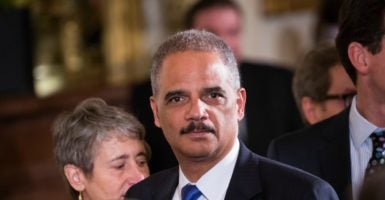The California Legislature is hiring former U.S. Attorney General Eric Holder to represent the state in expected fights with the new Trump administration over environmental, immigration, and criminal justice issues.
But based on Holder’s track record, don’t expect to see California racking up legal victories.
Although nobody is questioning the skills of the attorneys at Holder’s firm Covington & Burling, hiring Holder as, essentially, California’s outside counsel seems like an odd choice given that the Justice Department under Holder (and continued under Loretta Lynch) has one of the worst records of any modern presidency before the highest court in the land, the U.S. Supreme Court, losing far more cases than either of the Justice Departments of the prior Bush or Clinton presidencies.
Holder is also the only attorney general in history to be held in contempt by Congress for withholding documents related to Operation Fast and Furious, the most reckless law enforcement operation ever conducted by the Justice Department. That operation has resulted in the death of a U.S. Border Patrol agent, Brian Terry, as well as many Mexican citizens.
That also reflects poorly on Holder’s legal judgment.
Some may say that California is just preparing to do what other states like Texas have done in successfully suing the federal government during the Obama administration. But those cases are very different than what California is apparently planning to do.
The states have been suing to stop unconstitutional conduct by the executive branch when President Barack Obama failed in his duty to “faithfully execute” the law or acted unilaterally in ways that improperly changed the law.
The president does not have the authority to change, rewrite, or ignore federal laws he does not like. And federal agencies do not have the power to issue regulations outside the bounds of the statutes authorizing their conduct.
Stopping that type of misbehavior is the opposite of states attempting to obstruct enforcement of federal law or force the federal government to act outside its limited power.
For example, 26 states were successful in obtaining an injunction against Obama’s immigration amnesty plan because no president has the power to alter federal immigration law to provide amnesty and government benefits that have not been authorized by Congress or to decide that he will wholesale not enforce the law.
But California is going to try to prevent the new administration from enforcing federal immigration law despite the fact that the Constitution clearly gives Congress plenary authority over immigration and imposes a duty on the president (and thus the executive branch) to enforce the law.
Similarly, one of the reasons for California’s economic decline and severe budget shortfall problems is that it has been rated as the worst state in the country to do business in for the past 12 years in an annual survey of CEOs by the Chief Executive Network because of its high taxes and burdensome regulations.
As one CEO said in the survey, “California has been running businesses out of the state for years, and in fact, their policies are getting worse.”
Yet the state is hiring Holder to start a crusade against any efforts by the Trump administration to reduce the severe federal regulatory burden that adds to the negative effects on businesses and consumers that California already imposes.
Furthermore, the news that the California Legislature is hiring Holder came only a day after Gov. Jerry Brown nominated Rep. Xavier Becerra, a Democrat, to be California’s new state attorney general.
Neither Brown nor Kevin de Leon, the Democratic leader of the state Senate who was quoted in a New York Times article praising Holder’s retention, seemed to realize the complete lack of confidence retaining Holder shows in Becerra’s legal ability to carry out his role as attorney general—which is defending the state of California and its interests in environmental, immigration, and criminal justice issues.
This is particularly humiliating for Becerra given that he had told the Los Angeles Times that he intends to protect California’s “progressive” policies on immigration, Obamacare, energy, and criminal justice.
Becerra has already challenged the federal government, saying that “If you want to take on a forward-leaning state that is prepared to defend its rights and interests, then come at us.”
Looks like he is not going to get that chance, however, even if he is confirmed as the attorney general. Those cases will instead be handled by Holder and an entire team of lawyers at Holder’s private law firm, Covington & Burling, a premier Washington, D.C., law firm not exactly known for its low billing rates.
There is little doubt that California taxpayers, who are already living in a state with high taxes and huge budget problems, are going to get soaked for a lot of legal costs in addition to the price they already pay for the Office of the State Attorney General, which has 4,500 lawyers, investigators, police officers, and other staff.
Apparently, however, the California Legislature doubts their ability to fulfill their duties of defending the state’s interests.
All of this illustrates that the California Legislature has made a poor—but no doubt a very expensive—choice that will hurt the state.
But it is hardly surprising, I suppose, that the state would hire a former attorney general whose Justice Department did everything it could to defend the mountain of new, out-of-control regulations issued by the Obama administration in order to try to keep those economically costly regulations in place.
Nor is it shocking that an attorney general who did everything he could to avoid enforcing federal immigration law during the Obama administration will now try to help California obstruct the enforcement of federal immigration law during the Trump administration.
Holder’s goals seem to have stayed the same; it’s just the playing field that has changed.
































